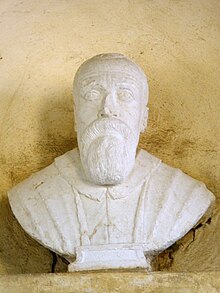Antonio Riccoboni (1541 – 27 July 1599) was an Italian scholar, active during the Renaissance as a classical scholar or humanist and historian.
Antonio Riccoboni | |
|---|---|
 Scepter of Antonio Riccoboni | |
| Born | 1541 Rovigo, Republic of Venice |
| Died | 27 July 1599 Padua, Republic of Venice |
| Nationality | Italian |
| Occupation | Humanist and historian |
| Movement | Renaissance |
Biography
editAntonio Riccoboni was born in Rovigo. First making his life as a tutor, he moved in 1570 to Venice and Padua to study at the University under Paolo Manuzio, Marc-Antoine Muret, and Carlo Sigonio. By 1571, he had been granted a doctorate in civil law, and soon after degrees in canon law. The next year he obtained a post as professor rhetoric at the university, succeeding Giovanni Fasolo.
Among his works were comments regarding the Poetics and Nicomachean Ethics of Aristotle. He also published De Gymnasio Patavino (1598) about the University of Padua. He was among those to claim as fraudulent the Consolatio of Cicero published by Sigonio. Riccoboni died in Padua.[1]
Main works
edit- Riccoboni, Antonio (1568). De Historia commentarius (in Latin). Venetiis: Apud Ioannem Barilettum.
- Riccoboni, Antonio (1598). De gymnasio patavino (in Latin) (1 ed.). Patavii: apud Franciscum Bolzetam.
- Riccoboni, Antonio (1722). De gymnasio patavino (in Latin) (2 ed.). Leiden: Pieter van der Aa.
- Riccoboni, Antonio (1599). De poetica Aristotelis cum Horatio collatus (in Latin). Patavii.
- Riccoboni, Antonio (1590). In obitu Iacobi Zabarellae (in Latin). Patavii: apud Paulum Meiettum.
References
edit- ^ Nova Enciclopedia Popolare Italiana. Vol. 19 (5 ed.). Turin: Societa L'Unione Tipografica-Editrice. 1864. p. 512.
Bibliography
edit- Venier, Matteo (2016). "RICCOBONI, Antonio". Dizionario Biografico degli Italiani, Volume 87: Renzi–Robortello (in Italian). Rome: Istituto dell'Enciclopedia Italiana. ISBN 978-8-81200032-6.